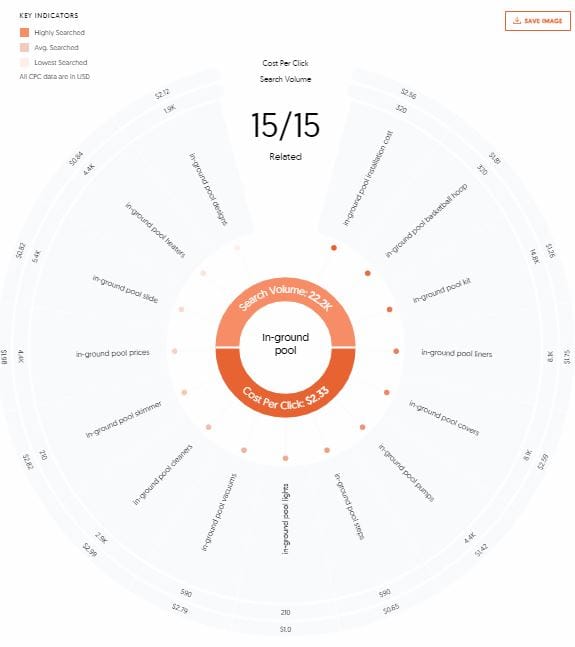Struggling to find low-competition keywords? You’re in good company. Keyword research represents the most time-consuming SEO task for marketers.
Yet, keyword research is crucial to your content marketing ROI. Keywords affect your potential to rank higher in search results and improve conversions, so choosing them isn’t a decision to make lightly. If you select keywords with a high difficulty, you might struggle to rank for those terms—and you won’t get the results you expect from your content.
Keyword competition can turn your entire SEO strategy on its head, forcing you to get creative about the terms you target. Let’s explore how you can still win with SEO when your preferred keywords are too difficult to rank for.
Professional Tips for Choosing Keywords You Can Actually Rank For
When doing keyword research for your content, you won’t always choose the most obvious search terms. It sounds counterintuitive, but the keywords that most easily come to mind can also be the most difficult to rank for.
Instead, you’ll need to dive deeper into keyword research to find search terms you stand a chance of ranking for. Use our tips to help you be selective about your keywords.
1. Check Keyword Difficulty First
Checking keyword difficulty is free. Even better, your SEO tools can offer related keyword suggestions along with their difficulty ratings. This is a great way to find hidden gems that will add value to your keyword strategy.
Try out free tools like UberSuggest, Moz Keyword Explorer, or Google Keyword Planner to check keyword competition. Just enter your keyword and you’ll get a list of metrics, including SEO difficulty.
Difficulty is rated on a scale of 1-100, where lower numbers are easier to rank for and higher numbers are more difficult to rank for.
You can also check the paid difficulty of keywords. This is helpful when you’re running paid ads, as lower difficulty ratings could mean a lower cost per click.
If you’re having trouble finding achievable keywords, try making them more specific. More than 90% of search queries use long-tail keywords and nearly 15% of keywords are phrased as a question. Long-tail keywords, consisting of at least 3 words, are generally more actionable because they combine a generic keyword (“in-ground pool”) with a set of qualifiers (“fiberglass,” “installation,” “near me”). They often represent a buyer who has researched their needs and is ready to purchase your solution.
Free tools like Answer the Public can help you identify those niche, long-tail keywords that will spark action for your reader. It organizes queries related to your keyword that people actually search on common platforms like Google, YouTube, TikTok, and Amazon.

2. Target a Wide Range of Keywords
Many marketers make the mistake of focusing only on keywords that have a high monthly search volume (500+ searches). But doing so means missing out on a massive sea of potential terms that can drive traffic to your site. Small amounts of traffic can still make an impact, so it’s worthwhile to keep your options open.
When doing keyword research, choose keywords that vary in difficulty, search volume, and topics. Keyword research is highly experimental, and having a variety can help you gain faster insights into what works and what doesn’t.
For example, the keyword “best smartphones 2024” is highly competitive because tons of tech sites, blogs, and retailers are all trying to appear on the first page of search results for that phrase. According to UberSuggest, it has a difficulty of 79, which is high.

On the other hand, a less competitive keyword could be something more niche, like “best waterproof smartphone cases for kayaking,” where fewer websites are directly competing. According to UberSuggest, this keyword has a difficulty of 4, which indicates it’s easy to rank for.

3. Choose Keywords with Low Difficulty (Including Zero-Volume Keywords)
Zero-volume keywords are keywords that do not receive any monthly searches. In our example above, the keyword “best waterproof smartphone cases for kayaking” had zero monthly searches. In fact, according to Ahrefs, about 95% of keywords are searched fewer than 10 times per month.
But that doesn’t mean people will never search for that term. In Google, about 15% of searches are new, meaning they’ve never been searched before. Keyword trends change all the time, which is why you should focus on the lowest-hanging fruit first.
SEO builds on itself. Garnering rankings for a bunch of keywords will pave the way to rank for higher difficulty terms. It’s like a snowball that picks up bulk and speed as it rolls down the mountain.
Low-difficulty keywords should be a top priority, regardless of traffic. As you acquire these keywords, you’ll start driving traffic and giving search engines context about your site. Both of these will make it easier to rank for additional keywords as you go.
4. Increase Your Domain Authority
Domain authority (DA) is a metric developed by Moz to indicate a website’s likelihood of ranking high in search results. It doesn’t take into account the difficulty of keywords; rather, it focuses on a website’s authoritativeness.
DA is rated on a scale of 1 to 100; the higher the DA, the more authoritative your site appears to search engines. Websites like LinkedIn and The New York Times have high DAs; brand-new websites typically have low DAs.
You can increase your site’s DA by acquiring backlinks from websites that have high DAs and are relevant to your site’s content. Backlinks are the ultimate trust signal. Each backlink is a vote of confidence from the linking website that your content is trustworthy and high quality.
As a bonus, backlinks can also send you free referral traffic, which is another SEO ranking signal.
5. Produce New Content Consistently
New content shows search engines you’re serious about providing the best online experience possible. It gives visitors a reason to return to your site. It shows you’re maintaining an active online presence. And most importantly, every new piece of content gives search engines more context about your website.
Fresh content also means new opportunities to rank for more keywords, which means more ways to appear in search results. An often overlooked, yet very efficient, way to create more content is optimizing your outdated content. Updating a stale blog post with the latest resources, stats, and examples is one of the easiest ways to boost your rankings because Google will recognize the post as new content. Plus, it gives you an opportunity to add relevant keywords and more internal links.
6. Focus on One Primary Keyword Per Piece of Content
It’s a knee-jerk reaction to place as many keywords in your content as possible—more is more, right? A better practice is to choose a primary keyword for each piece of content and focus on optimizing it for that keyword. You can sprinkle in related keywords as needed, but just one keyword will be the start of your piece.
This strategy works for several reasons:
- Your content is more focused and specific.
- Search algorithms can better understand what your content is about.
- It’s easier to rank for that keyword because you’ve optimized your content for it.
- It’s easier to track your analytics and content performance.
- You can build a clear, concise internal linking structure.
In this case, less is more.
How to Rank for Highly Competitive Keywords
Ranking for difficult keywords isn’t impossible. Type in any search term and there are websites appearing on Google’s Page 1 for those terms. However, some websites are more likely to rank for competitive keywords than others.
You have a better chance of ranking for difficult keywords when you:
- Have an established website and history (e.g., not a brand-new website)
- Create high-quality content
- Gain substantial monthly website traffic
- Optimize your content for search engines
- Have a strong backlink profile
- Have a high or growing domain authority
- Regularly update and improve your content
- Build authority in your niche
Remember that a search engine’s job is to return the most relevant, high-quality results to its searchers. It uses a combination of factors to rank websites, and having the above criteria can help you establish credibility and authority. These are key to getting search engines to trust your content and also understand what your content is about so they can showcase you in the right search results.
How Content Pros Can Help You Conquer Keyword Competitiveness
Whether you’re brand new to SEO or you’re not seeing the progress you’d like, it might be time to rethink your approach to keyword selection. Popular keywords can be highly competitive, and you might not yet be in a position to rank for them. Our above tips can help you prioritize low-difficulty keywords that will create your “keyword snowball” and start ranking for the terms you want.
Content Pros can support your strategy by producing consistent, high-quality content on your behalf. Our team of 20+ writers and editors have a background in SEO and can help put your keywords into motion. Consistent content positions you as an online authority in your niche, allowing you to rise through the rankings and grow your business.
Contact us today to schedule a demo and take our content writing services for a discounted test drive.

